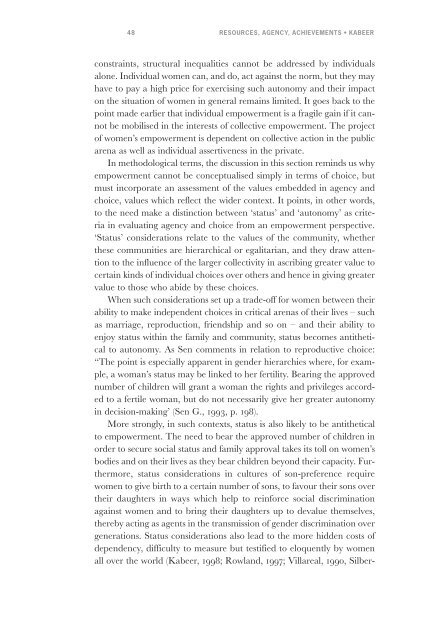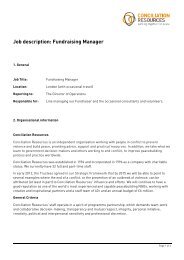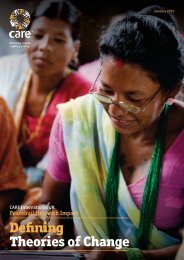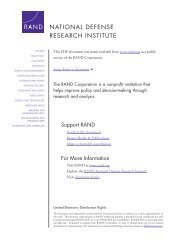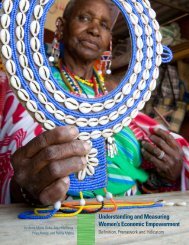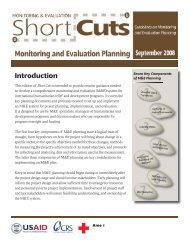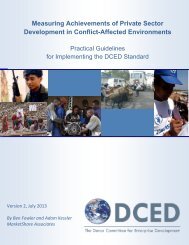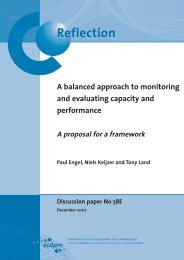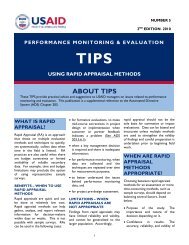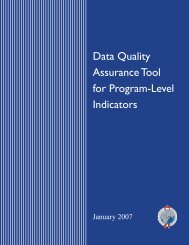Discussing Women's Empowerment - Sida
Discussing Women's Empowerment - Sida
Discussing Women's Empowerment - Sida
You also want an ePaper? Increase the reach of your titles
YUMPU automatically turns print PDFs into web optimized ePapers that Google loves.
48 RESOURCES, AGENCY, ACHIEVEMENTS • KABEER<br />
constraints, structural inequalities cannot be addressed by individuals<br />
alone. Individual women can, and do, act against the norm, but they may<br />
have to pay a high price for exercising such autonomy and their impact<br />
on the situation of women in general remains limited. It goes back to the<br />
point made earlier that individual empowerment is a fragile gain if it cannot<br />
be mobilised in the interests of collective empowerment. The project<br />
of women’s empowerment is dependent on collective action in the public<br />
arena as well as individual assertiveness in the private.<br />
In methodological terms, the discussion in this section reminds us why<br />
empowerment cannot be conceptualised simply in terms of choice, but<br />
must incorporate an assessment of the values embedded in agency and<br />
choice, values which reflect the wider context. It points, in other words,<br />
to the need make a distinction between ‘status’ and ‘autonomy’ as criteria<br />
in evaluating agency and choice from an empowerment perspective.<br />
‘Status’ considerations relate to the values of the community, whether<br />
these communities are hierarchical or egalitarian, and they draw attention<br />
to the influence of the larger collectivity in ascribing greater value to<br />
certain kinds of individual choices over others and hence in giving greater<br />
value to those who abide by these choices.<br />
When such considerations set up a trade-off for women between their<br />
ability to make independent choices in critical arenas of their lives – such<br />
as marriage, reproduction, friendship and so on – and their ability to<br />
enjoy status within the family and community, status becomes antithetical<br />
to autonomy. As Sen comments in relation to reproductive choice:<br />
“The point is especially apparent in gender hierarchies where, for example,<br />
a woman’s status may be linked to her fertility. Bearing the approved<br />
number of children will grant a woman the rights and privileges accorded<br />
to a fertile woman, but do not necessarily give her greater autonomy<br />
in decision-making’ (Sen G., 1993, p. 198).<br />
More strongly, in such contexts, status is also likely to be antithetical<br />
to empowerment. The need to bear the approved number of children in<br />
order to secure social status and family approval takes its toll on women’s<br />
bodies and on their lives as they bear children beyond their capacity. Furthermore,<br />
status considerations in cultures of son-preference require<br />
women to give birth to a certain number of sons, to favour their sons over<br />
their daughters in ways which help to reinforce social discrimination<br />
against women and to bring their daughters up to devalue themselves,<br />
thereby acting as agents in the transmission of gender discrimination over<br />
generations. Status considerations also lead to the more hidden costs of<br />
dependency, difficulty to measure but testified to eloquently by women<br />
all over the world (Kabeer, 1998; Rowland, 1997; Villareal, 1990, Silber-


